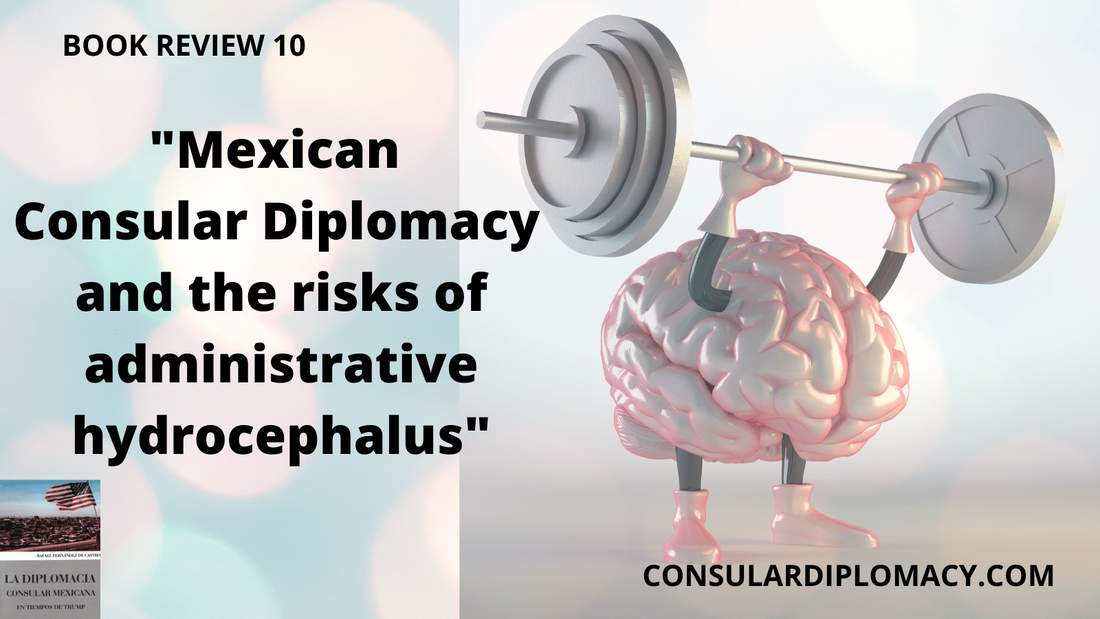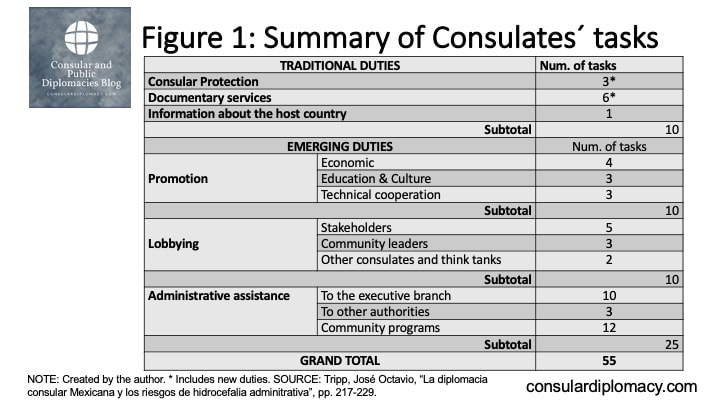 There are only two more chapters to review of the book Mexican Consular Diplomacy in Trump´s Era, so today, I will comment on the essay written by Ambassador José Octavio Tripp titled “Mexican Consular Diplomacy and the risks of administrative hydrocephalus.” The chapter´s main point is that Mexico´s Consular Diplomacy's success in the United States has the risk of demanding too much from the consular network, developing hydrocephalus. He describes how, through the years, the consulates ´responsibilities have nearly fourth-fold, without the same amount of additional resources. As the reader will learn, this essay is the perfect description of the consular affairs modernization process that most countries have undertaken in the second part of the 20th century referred to in the work of Maaike Okano-Heijmans and Jan Melissen titled Foreign Ministries and the Rising Challenge of Consular Affairs: Cinderella in the Limelight. Additionally, it closely follows the definition of Consular Diplomacy presented by Maaike Okano-Heijmans, a scholar of the Clingendael Institute, in the paper “Change in Consular Assistance and the Emergence of Consular Diplomacy”. In his essay, Ambassador Tripp explains that the consulates could suffer from abnormal and harmful growth, similar to a brains´ hydrocephalus if they continue to expand their obligations.[i] He proposes developing a plan that evaluates what works and what does not, focusing on Mexico's foreign policy goals. In the section titled “Genesis”, Tripp explains that September 11, 2001, terrorist attacks are the origin of Mexico's Consular Diplomacy. It resulted from the end of the circular migration of Mexican due to growing immigration enforcement at the border and in the interior of the U.S.[ii] He discusses the efforts taken by the government of Mexico in its Consular ID card program, indicating that was the iconic activity of Mexico´s Consular Diplomacy at that time.[iii] Interestingly, Tripp includes a definition of Consular Diplomacy from the then Undersecretary for North America, Sergio M. Alcocer Martínez de Castro, in the introduction to the volume dedicated to Consular Diplomacy of the Revista Mexicana de Política Exterior: “public policy, that besides dealing with the traditional tasks of documentation services and protection to citizens, explores new action areas, such as the promotion of Mexico´s economic and technological interest, with the double purpose to empower Mexicans abroad and promote the national interest.”[iv] However, the Ambassador indicates that this definition is insufficient because it did not include some of its elements, such as communitarian activism and consular political-administrative management.[v] In the second part of the chapter, Tripp describes the growing consular responsibilities from the 1990s onward, indicating that they have jumped from seven traditional duties to nearly 50 overall.[vi] The Ambassador explains the development of new consular responsibilities in three major areas:
Tripp emphasizes that this list did not include all the administrative responsibilities that, even though they are not classified as services, they utilize the consulates´ limited time and resources.[viii] Afterward, he briefly describes some of the new tasks that the consulates have to perform, as seen in Figure 1 at the bottom of the post. As the consulates' duties grew, the Ambassador explains, so the media's attention to Consular Affairs. So, in a high visibility case, the consul has to deal not only with local authorities but also with multiple Mexican actors.[ix] The Ambassador identifies two essential characteristics of Mexico´s Consular Diplomacy:
Tripp identifies positive and negative consequences of the transformation of the Mexican Consular Diplomacy:
The expansion of Mexico´s international reputation, together with offering unique services to its Diaspora, indicates that Consular Diplomacy will continue to develop in the future. However, the Ambassador warns about the risks of excessively burdensome consular work.[xiii] Tripp states that it is imperative to develop a comprehensive plan that establishes the priorities and delineates its limits, so Mexico´s Consular Diplomacy can be sustainable in the long run. It is essential to limit its growth and eliminate no-priority tasks.[xiv] As part of the planning process, the Ambassador includes the need to define the consulate´s vocation or niche. For example, he distinguishes a border consulate's priorities from one located in a high tech or research region. Furthermore, he indicates the necessity of having a flexible evaluation process that focuses on the consulate's efficiencies of its main tasks.[xv] The chapter is a valuable contribution because it shows the impressive growth of consular duties and its risks. It also describes the greater weight of consular affairs in Mexico´s foreign policy and the growing interests of the media and politicians. Besides, Tripp proposes developing a plan that eliminates non-fundamental tasks and seeks to limit citizen´s expectations of consular protection and services. The Ambassador indicates that Mexico increased its reputation, not only amongst Mexicans but internationally, so he found a new source of soft power and a tool for nation-branding. Additionally, implicitly, he states other Mexican authorities' interest to have an international presence or expand its programs to cater to Mexicans abroad. Interestingly enough, the consulates have responded to the augmentation of its responsibilities successfully, although, as the Ambassador commented, it might distract resources from their fundamental obligations. I believe that they have done that efficaciously by expanding the partnerships with local and state allies. [i] Tripp, José Octavio, “La diplomacia consular mexicana y los riesgos de la hidrocefalia administrativa” en La Diplomacia Consular Mexicana en Tiempos de Trump, 2018, p. 217. [ii] Ibid. p. 218. [iii] Ibid. p. 219. [iv] Ibid. p. 219. [v] Ibid. p. 219. [vi] Ibid. p. 220. [vii] Ibid. p. 220. [viii] Ibid. p. 220. [ix] Ibid. p. 226. [x] Ibid. p. 226-227. [xi] Ibid. p. 227. [xii] Ibid. p. 228. [xiii] Ibid. p. 227. [xiv] Ibid. p. 228. [xv] Ibid. p. 228-229. DISCLAIMER: All views expressed on this blog are that of the author and do not represent the opinions of any other authority, agency, organization, employer or company.
0 Comments
Your comment will be posted after it is approved.
Leave a Reply. |
Rodrigo Márquez LartigueDiplomat interested in the development of Consular and Public Diplomacies. Archives
May 2024
Categories
All
|

